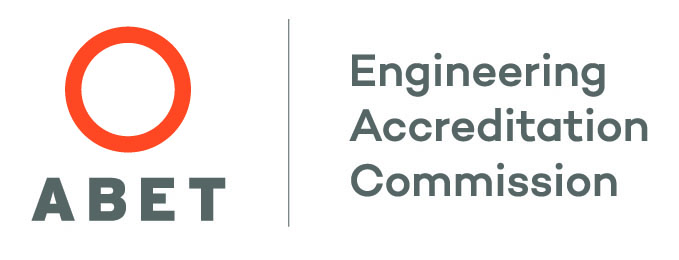Accreditation
The bachelor's program in electrical engineering is accredited by the Engineering Accreditation Commission of ABET, https://www.abet.org, under the General Criteria and the Program Criteria for Electrical, Computer, Communications, Telecommunication(s) and Similarly Named Engineering Programs.
Program Educational Objectives
Constituents: Current students, alumni, employers, and faculty
The electrical engineering program educational objectives are to produce exceptional graduates who within a few years after graduation:
- Advance professionally with increasing leadership and responsibility beyond entry level in an industry relevant to electrical engineering.
- Contribute to organizational objectives with significant societal benefits in an ethically responsible manner.
- Engage in life-long learning through professional activities, training, and networking, the pursuit of higher educational degrees, and individual professional development.
Student Outcomes
The student outcomes used by the electrical engineering program are those published in the ABET “Criteria for Accrediting Engineering Programs” document. Those outcomes are as follows:
- an ability to identify, formulate, and solve complex engineering problems by applying principles of engineering, science, and mathematics
- an ability to apply engineering design to produce solutions that meet specified needs with consideration of public health, safety, and welfare, as well as global, cultural, social, environmental, and economic factors
- an ability to communicate effectively with a range of audiences
- an ability to recognize ethical and professional responsibilities in engineering situations and make informed judgments, which must consider the impact of engineering solutions in global, economic, environmental, and societal contexts
- an ability to function effectively on a team whose members together provide leadership, create a collaborative and inclusive environment, establish goals, plan tasks, and meet objectives
- an ability to develop and conduct appropriate experimentation, analyze and interpret data, and use engineering judgment to draw conclusions
- an ability to acquire and apply new knowledge as needed, using appropriate learning strategies.
Program Criteria
The Electrical Engineering Program criterion as listed in the ABET "Criteria for Accrediting Engineering Programs" is as follows:
Curriculum:
The structure of the curriculum must provide both breadth and depth across the range of engineering topics implied by the title of the program.
The curriculum must include probability and statistics, including applications appropriate to the program name; mathematics through differential and integral calculus; sciences (defined as biological, chemical, or physical science); and engineering topics (including computing science) necessary to analyze and design complex electrical and electronic devices, software, and systems containing hardware and software components.
The curriculum for programs containing the modifier “electrical,” “electronic(s),” “communication(s),” or “telecommunication(s)” in the title must include advanced mathematics, such as differential equations, linear algebra, complex variables, and discrete mathematics.
The curriculum for programs containing the modifier “computer” in the title must include discrete mathematics.
The curriculum for programs containing the modifier “communication(s)” or “telecommunication(s)” in the title must include topics in communication theory and systems.
The curriculum for programs containing the modifier “telecommunication(s)” must include design and operation of telecommunication networks for services such as voice, data, image, and video transport.
Mission
The mission of the Phillip M. Drayer Department of Electrical Engineering is to provide students with high quality, accessible undergraduate and graduate electrical engineering education; to engage and empower students with skills and knowledge to thrive in professional careers; and to serve society through economic and technological development of Southeast Texas and beyond.
Program Enrollment and Degree Data
|
|
|
Enrollment Year |
Total Undergrad |
Total Grad |
Degrees Awarded |
||||||||
|
|
Academic Year |
1st |
2nd |
3rd |
4th |
5th+ |
Associates |
Bachelors |
Masters |
Doctorates |
|||
|
Current Year |
23/24 |
FT |
53 |
37 |
27 |
10 |
13 |
140 |
85 |
|
38 |
25 |
1 |
|
PT |
15 |
16 |
16 |
8 |
27 |
82 |
13 |
|
|
|
|
||
|
1 |
22/23 |
FT |
39 |
40 |
13 |
14 |
12 |
118 |
45 |
|
24 |
27 |
1 |
|
PT |
19 |
12 |
10 |
11 |
24 |
76 |
13 |
|
|
|
|||
|
2 |
21/22 |
FT |
49 |
25 |
21 |
17 |
18 |
130 |
32 |
|
31 |
8 |
2 |
|
PT |
11 |
16 |
11 |
14 |
16 |
68 |
14 |
|
|
|
|||
|
3 |
20/21 |
FT |
38 |
29 |
26 |
20 |
12 |
125 |
18 |
|
26 |
7 |
4 |
|
PT |
13 |
12 |
13 |
13 |
17 |
68 |
15 |
|
|
|
|||
|
4 |
19/20 |
FT |
35 |
36 |
23 |
14 |
21 |
129 |
16 |
|
37 |
19 |
4 |
|
PT |
11 |
9 |
14 |
8 |
21 |
63 |
17 |
|
|
|
|||
FT—full-time
PT—part-time